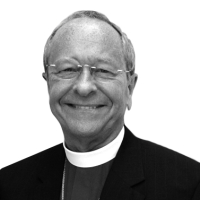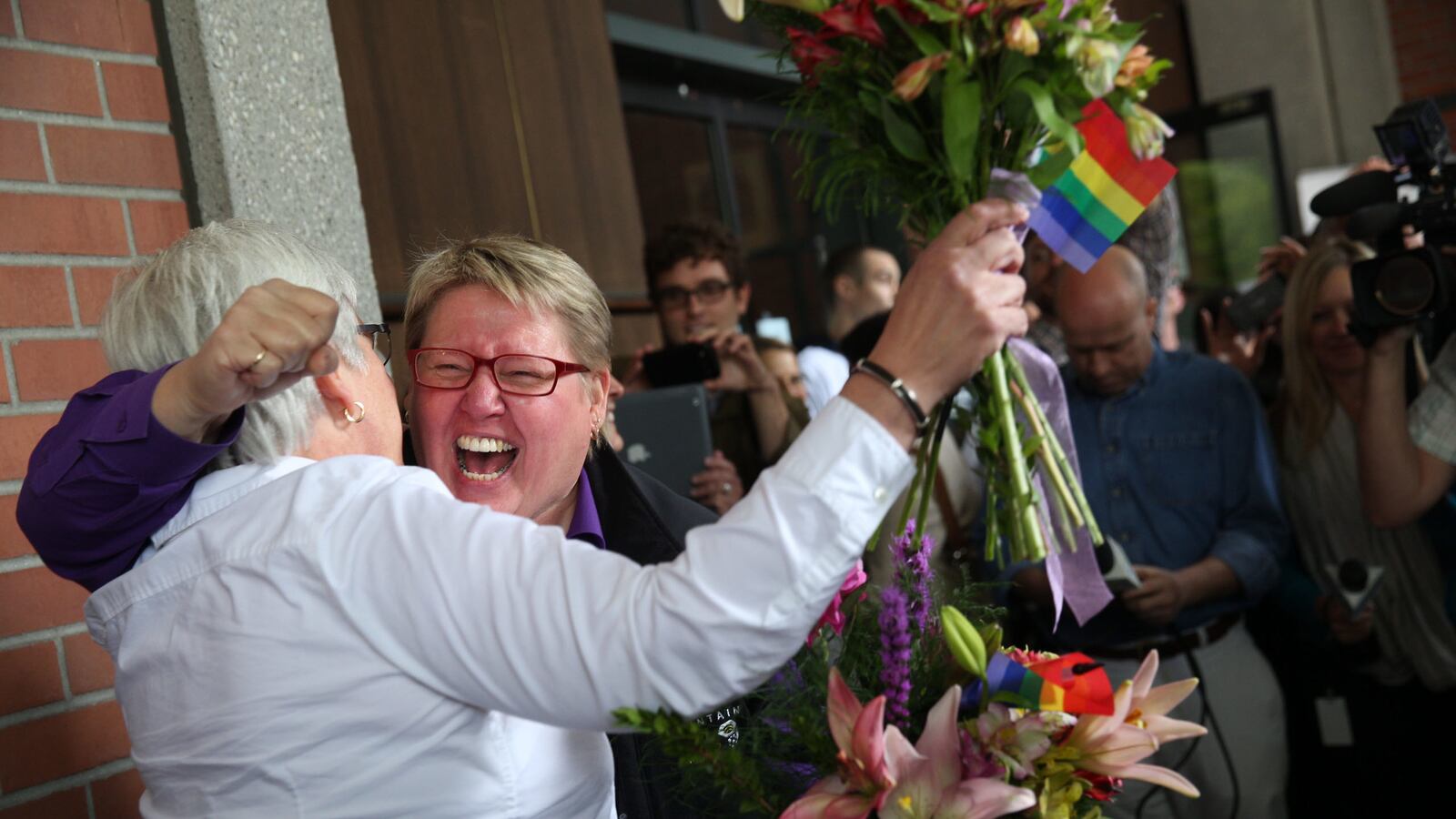Stepping off the plane last Monday in Portland, Oregon, something felt different. It was not just that the sun was shining brilliantly in a place infamous for its cloudiness. It was the broad smile and exuberant expression on the face of the Oregon Equality for Marriage representative who was meeting my plane.

I knew that Judge Michael McShane was scheduled to rule on Oregon’s constitutional amendment banning same-sex marriage that very day. I could tell by the face of the young man who met me that his ruling had gone well for marriage equality. Indeed, not only had Judge McShane declared the amendment to be in violation of the Constitution, but there would be no more appeals and no stay on the ruling. Excitedly, this campaign worker told me that marriages were already occurring, as we spoke. It was a new day for gay or lesbian Oregonians wishing to exercise their constitutional right to marry the person they love.
Arriving at the Melody Ballroom, the atmosphere was a frenzy of joy, jubilation and holy bedlam. Eight makeshift altars had been set up around the hall, each adorned with a white covering and fresh flowers. Organizers had miraculously transformed the hall into a holy and special place; buckets of fresh flowers were placed all around, so that each expectant couple could carry or wear free-for-the-taking flowers for the occasion. Gay and lesbian couples stood in line, most accompanied by friends and family, waiting to offer their public vows of commitment to one another. And clergy, bedecked in liturgical vestments and stoles, provided leadership and blessing for the nuptials. Indeed, there were more willing clergy than could be effectively employed.
And this is what was so striking to me: Clergy and people representing many denominations were there to celebrate the victory and offer themselves in service to the gay and lesbian couples who had waiting so long for this day, this moment. Not very long ago, religious people were the biggest barrier to this day happening at all. And here they were, standing with their gay and lesbian brothers and sisters, offering God’s blessing on the unions taking place.
Downstairs there was one big reception going on. Newly married couples and their families and friends melded into one giant, collective wedding reception, laughing and crying, still finding it hard to believe what had finally happened. Both the Episcopal bishop and the Lutheran bishop were present, once again underscoring the remarkable support marriage equality now has among mainline religious people and denominations. There was music and lots of dancing. No one was in a bad mood, for the day of rejoicing had come.
Finally, around 7 p.m., the gathering became more formal, and a gospel choir led us in song. The crowd didn’t need much in the way of encouragement to sing out the African-American spiritual, filled with words of grateful thanksgiving and irrepressible hope. And then, it was my honor to address the crowd. Of course I joined in the jubilation. But I also felt called to sound a note of caution, even at this spectacularly joyful moment.
The next day would bring another victory for marriage equality, as federal Judge John Jones similarly declared Pennsylvania’s ban on gay marriage unconstitutional, adding that such laws should be tossed “into the ash heap of history.” Even more unexpected was Pennsylvania’s Governor Tom Corbett, a fierce opponent of marriage equality, announcing that he and the state of Pennsylvania would not appeal the judge’s decision, declaring that such an effort would be “extremely unlikely to succeed.” Even to its critics, marriage equality seemed to be taking on the air of inevitability.
And that’s why I spoke a note of caution to the joyous crowd in Portland, even as they celebrated their victory. An air of inevitability can be a dangerous thing. First of all, people stop working for things that seem simply inevitable. And when people stop working, progress can slow or halt altogether. The forces resisting the full inclusion of LGBT people are formidable still. A majority of states still do not offer the institution, responsibilities and privileges of marriage to its gay or lesbian couples. The more states that embrace marriage equality, the more likely the Supreme Court is going to make it the law of the land. And until that happens, we need to keep pushing for our equal rights.
The other reason for caution is that marriage is not the only issue facing gay, lesbian, bisexual and transgender people. Even when marriage equality becomes the law in all of America, there will be much to accomplish. Young people are still being bullied in schools, causing them to do poorly in school or drop out altogether in disproportionate numbers. Because of the negative messages being received by young LGBT people, we still have far too many who see no way of surviving, let alone thriving, and tragically take their own lives. LGBT youth are disproportionately targeted by law enforcement and enter the school-to-prison pipeline.
An air of inevitability about marriage equality can lull us into thinking that others matters related to LGBT equality will naturally be resolved as well—a belief for which there is no evidence. In most states, there are no anti-discrimination laws to protect LGBT people at work. In fact, Pennsylvania is a perfect example of a state which now offers gay couples the right to marry—but if someone’s boss reads about the wedding in the newspaper, that person can be fired from his or her job simply for being gay, with no recourse in the courts. A fully inclusive Employment Non-Discrimination Act is far from being inevitable. In the near future, it probably isn’t even achievable without sustained and dedicated work by LGBT people and their allies.
I congratulate and celebrate with the good people of Oregon as marriage equality becomes a reality. It is good and right to celebrate this success and to be thankful for the justice of the courts. But it is no time to relax our demand that “liberty and justice for all” truly means “all.”
The Rt. Rev. V. Gene Robinson is the recently retired IX Episcopal Bishop of New Hampshire and a Senior Fellow at the Center for American Progress, Washington, D.C. Follow him on Twitter @BishopGRobinson





